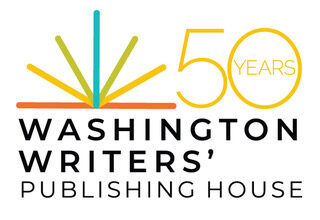WWPH WRITES ISSUE 48
Welcome to WWPH Writes 48…We are celebrating the end of National Poetry Month with poetry by Sean Murphy and his bluesy, lyrical lines in DuBose Heyward’s Blues. And under our occasional interview feature, THE TOP FIVE, we have WWPH Fellow Lindsay Forbes Brown asking her five big questions of master poets Grace Cavalieri and Myra Sklarew on the one-year anniversary of their new WWPH editions: Why I Cannot Take A Lover and Altamira. Plus, we’re looking forward to the Gaithersburg Book Festival on May 20th–stop by our table and say hello! Read on!
Caroline Bock
co-president and fiction editor, WWPH Writes
WWPH WRITES: POETRY
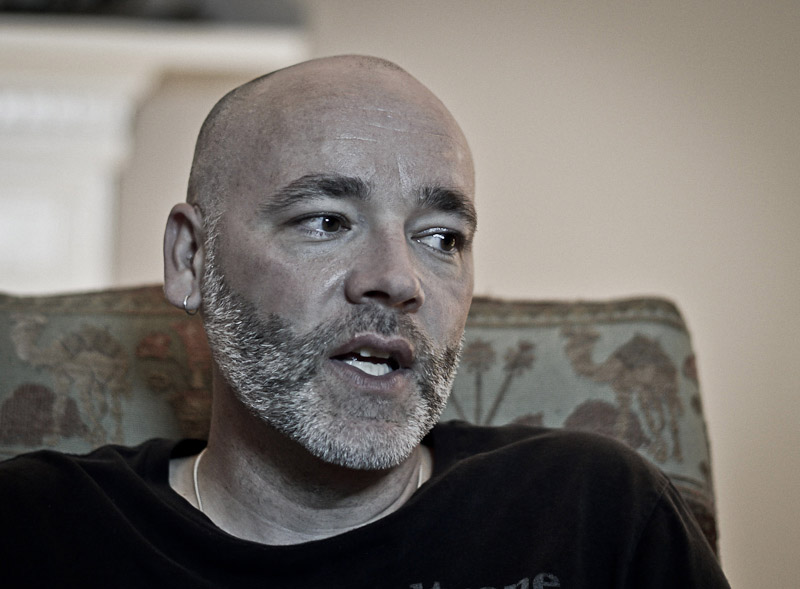
Sean Murphy is the Founding Director of 1455, a non-profit that celebrates storytelling. A long-time columnist for PopMatters, his work has also appeared in Salon, The Village Voice, Washington City Paper, The Good Men Project, Sequestrum, Blue Mountain Review, and others. His chapbook, The Blackened Blues, was published by Finishing Line Press in 2021. His second collection of poems, Rhapsodies in Blue was published by Kelsay Books in 2023, and This Kind of Man, his first collection of short fiction, is forthcoming in 2024. He has been nominated four times for the Pushcart Prize, twice for Best of Net, and his book Please Talk about Me When I’m Gone was the winner of Memoir Magazine’s 2022 Memoir Prize. To learn more, and read his published short fiction, poetry, and criticism, please visit seanmurphy.net/ and @bullmurph.
DuBose Heyward’s Blues*
Even in the 1980’s it wasn’t all bad
because in English 101 I first read
Porgy and Bess and it prepared me
for some things, especially when—
a few years later—Miles smiled
and I finally began to comprehend
a truth or two that anthologies
and college professors can never
articulate, words failing to explain shit
like context and cause and effect, and how
could “Summertime” break my brain
then build it back up each time, reaching me
in its wordless way? Then in walked Bud,
& Ella & Billie & Nina, so by the time I got to
post-grad I knew more about Gershwin—
(& appropriation) and how once again black artists
were obliged to reclaim their culture, elevating us
to places we wouldn’t need to go if the American Dream
offered what was advertised (words, again, talking
a big game but coming up empty in extra innings) and
why I see Emmet Till when Sun Ra takes his solo
on “I Loves You, Porgy,” proving truth’s more painful
than fiction b/c it feels real, even to not-so-innocent
bystanders, and maybe that’s why a recording from 1960
can kill me in all the right ways—suggesting something
about humankind’s deficiencies or redemption—and how
wood, brass, and wind express what words never could.
So, you see, this is what it means when I admit I don’t know
the blues but I understand them, or possibly I’ve got that
backwards, b/c my ears discern what my mind can’t define.
(*American writer Edwin DuBose Heyward’s most famous novel, Porgy (1925), was the basis of George Gershwin’s controversial opera Porgy and Bess (1935), featuring the compositions “Summertime,” and “I Loves You, Porgy,” both of which became jazz standards in subsequent decades, indelibly covered by icons like Miles Davis, Nina Simone, and Billie Holiday.)
From Rhapsodies in Blue (Kelsay Books, 2023–now available) ©Sean Murphy 2023; reprinted with permission from the author.
WWPH WRITES: THE TOP FIVE INTERVIEWS
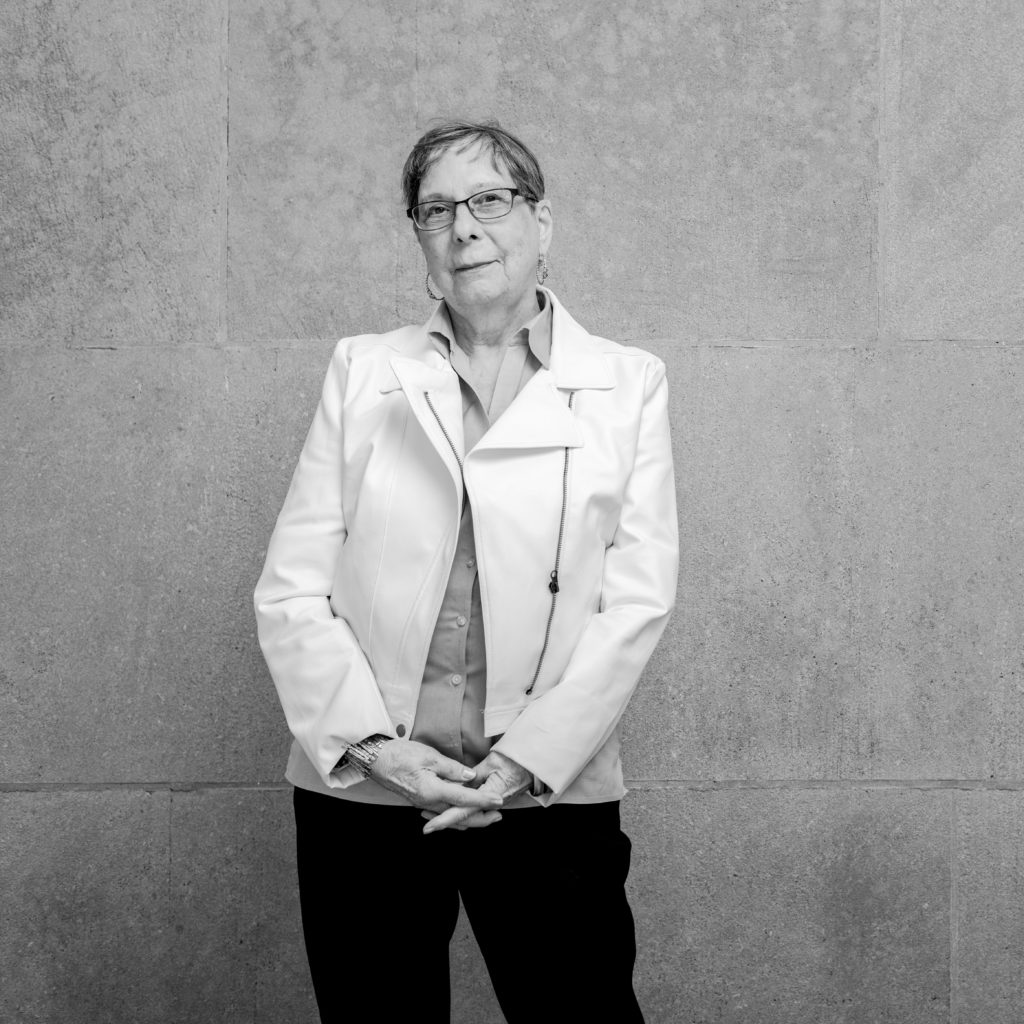
photo credit: Michael Morgan
WITH GRACE CAVALIERI
If you could pick one book that has changed your life as a poet, what would it be and why? If you could pick one book that has changed your life as a poet, what would it be and why? How do you view it? Is it a source of comfort, inspiration, or envy?
The poet who allowed me to be a writer was Edna St. Vincent Millay. From my teenage years, I was in love with her passion, lyricism, and bold truth. Remember, this was in the 1950’s when women didn’t speak publicly so honestly; and I championed Millay’s verbal ability and formal intelligence. Male critics ridiculed her, even my college professors, but I knew if something could penetrate the heart, its power could not be denied. I have many poets who guide me today, but I will never forget Edna St. Vincent Millay.
What would you caution your younger writerly self (or emerging writers) against?
I made every mistake in the book, on paper, and in-person, and I counsel everyone to do the same. Caution would kill the page. The opposite is what we wish for. Say it! Then remember every reader has felt the same: regret, ecstasy, shame, humiliation, vanity, hope. So why should we be afraid to name it? I think it is important to push oneself to write and push oneself to “present.” No one is going to invite the writer to the party so s/he/they must throw the party. Caution is anathema. Failure is better.
Do you have any writing quirks?
Yes, I have to have a cup of tea at my side. Shows my dependent personality.
Do you believe in muses? Have you ever had one?
Oh yes! We are not three-dimensional creatures sloshing about in the mud of civilization. We are divinely connected to the invisible, which is filled with voices and spirits and guides and angels who keep whispering. I pray to always listen—and better still, to hear.
You have written 26 collections and chapbooks of poetry. Looking to the horizon, what is your next project?
Twenty-six sounds like a lot, but several are chapbooks that house maybe 15 poems, and my strength and weakness is that I publish almost everything I write. Anyone can build a pile of paper (or litter) that way; it’s no great accomplishment. When I look back, however, I’m glad I did this as a record or emotional calendar. And I try not to feel shame at the unevenness. Howard Nemerov said we must love even “The short and ugly ones,” and so it was better to produce than hide the work, I think. But what’s next? I am struggling with Haiku, the most difficult of all poetic forms, and practicing this every day. My Selected & New Poems: THE LONG GAME is forthcoming this year, and that is my way of clearing the desk. Most of all, I intend to go on connecting disparate phrases and images I call poetry as that seems to be my necessity—my life force.
More on Grace Cavalieri here.
WITH MYRA SKLAREW
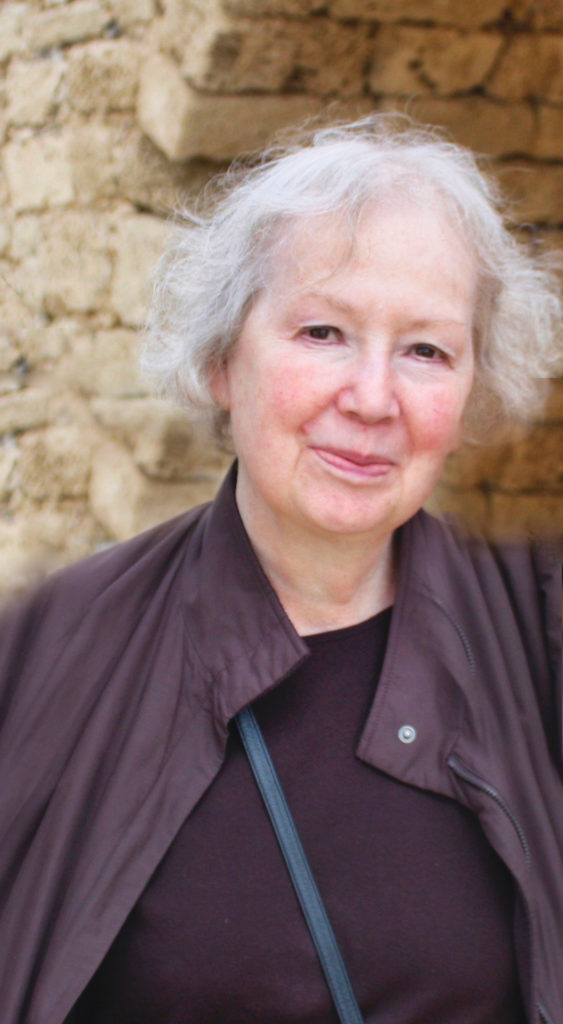
Can your writerly life be summed up in a phrase or motto? If so, what would it be?
Pure chaos. There was a time when my day would begin with sitting down and writing and then I was teaching which was very busy. Now I am occupied with many different kinds of projects, and I also have a life in science. It’s much more chaotic now. The internal dynamics of the brain are what create the chaos.
Your work is said to inquire about outsiders, longing, and belonging to the margins. You tackle questions about the existence of home and the clash of religion and culture. What draws you to this subject matter? Have you ever felt exiled in your own life or longing for another place?
This is the complex question of my entire life. Where do we belong?
I speak Greek, and with my husband and two little ones, we lived for a time with a Greek family. For two years we spoke Greek to one another and lived the Greek tradition. I began to go to a village by pure accident—there was an advertisement in a journal that talked about a mountain village—and because I spoke Greek, I could go into a place that was not particularly full of tourists. When I arrived, the village elder took me around to visit every family—about 15 of them—and when they saw me coming alone, the elderly women were very dismissive of me because they felt a woman shouldn’t travel alone, but later when my family and various relatives joined me, the old women patted me on the shoulder and told me I was “legitimate.” I went back to the village 4-5 times and those experiences made me think about going back to my Lithuanian heritage.
That place of longing for me is Lithuania, which is a small country with a small population and a very complex history. I found that walking through the villages and talking to the people who lived there changed my life. I only regretted that my own parents weren’t alive to share it with me. I went back several times, staying for long periods, and essentially reclaimed who I was. The joke about me in Lithuania is, “We are going to rent her a little wooden house so she can move in.” And it was true, the little wooden houses which had been there hundreds of years were, for me, enchanting.
I walked from one end of this place to the other, “walking through the archives of the feet,” and was lucky to be taken in by many people who shared their life stories. It became a second home, and the journey was all about trying to locate who you are and where you are from.
What would you consider to be your greatest achievement?
Children. I have a son and a daughter. It’s a singular gift we are given.
What qualities do you most admire in your favorite pieces of literature?
When I read poetry, I’m listening to the voice. I want to feel the voice of the poet, the living presence of the poet. When I read people like Dante and Rilke in the original language, no matter how poorly, I hear their voice, I want to hear their voice. It’s not just something on the page, it’s a soul, a body, it’s something else.
I was looking today at a poet that I really have loved over the years—a Polish poet named Tadeusz Różewicz. He wrote during a very difficult time in Poland and in the world. There’s a poem called “Leave Us Alone” which goes: Forget about us / about our generation / live like human beings / forget about us / we envied plants and stones / we envied dogs…I would like to fall asleep / and wake up after the war / … and so on.
There was something spare about Tadeusz Różewicz’s work. He is probably not known by many today, but I was raised during WWII, and it was a time in the country where Americans went to great lengths as a people to help. Most of us had family fighting in that war and it was a very different time than it is now. So that in a way, my thinking was shaped as was my understanding about what peoples suffer. We live in a very complicated world.
Rilke writes: “For beauty is nothing but the beginning of terror.” I think translation opens the world.
How would you describe a successful writing life?
I’m 88, so I’ve had different episodes of how the writing gets done and how I think about it. There is no definition of a successful writing life; it is simply something that is always there. Writing for me is instinctive; it’s like breathing; it’s an immovable part of my life. I don’t know why but I know it’s like teaching. It’s the same. I feel a calling to it.
More on Myra Sklarew here.
Lindsay Forbes Brown is currently enrolled at American University’s MFA program where she serves as Editor in Chief for FOLIO and Assistant Editor for Grace and Gravity. She is a Kenyon Review workshop alumnus and has work featured in JMWW and forthcoming in Sonora Review and So to Speak. The Washington Writers’ Publishing House was thrilled to have her as our first WWPH Fellow. The program is made possible by a generous grant from Dr. Jean Feldman.
WWPH Community News
Come visit us at the Gaithersburg Book Festival on May 20th and at the Capital Pride Festival on June 10th. Our first annual WWPH PRIDE Contest in poetry and micro-prose opens on June 1st. Keep reading WWPH Writes for more details in the upcoming weeks!
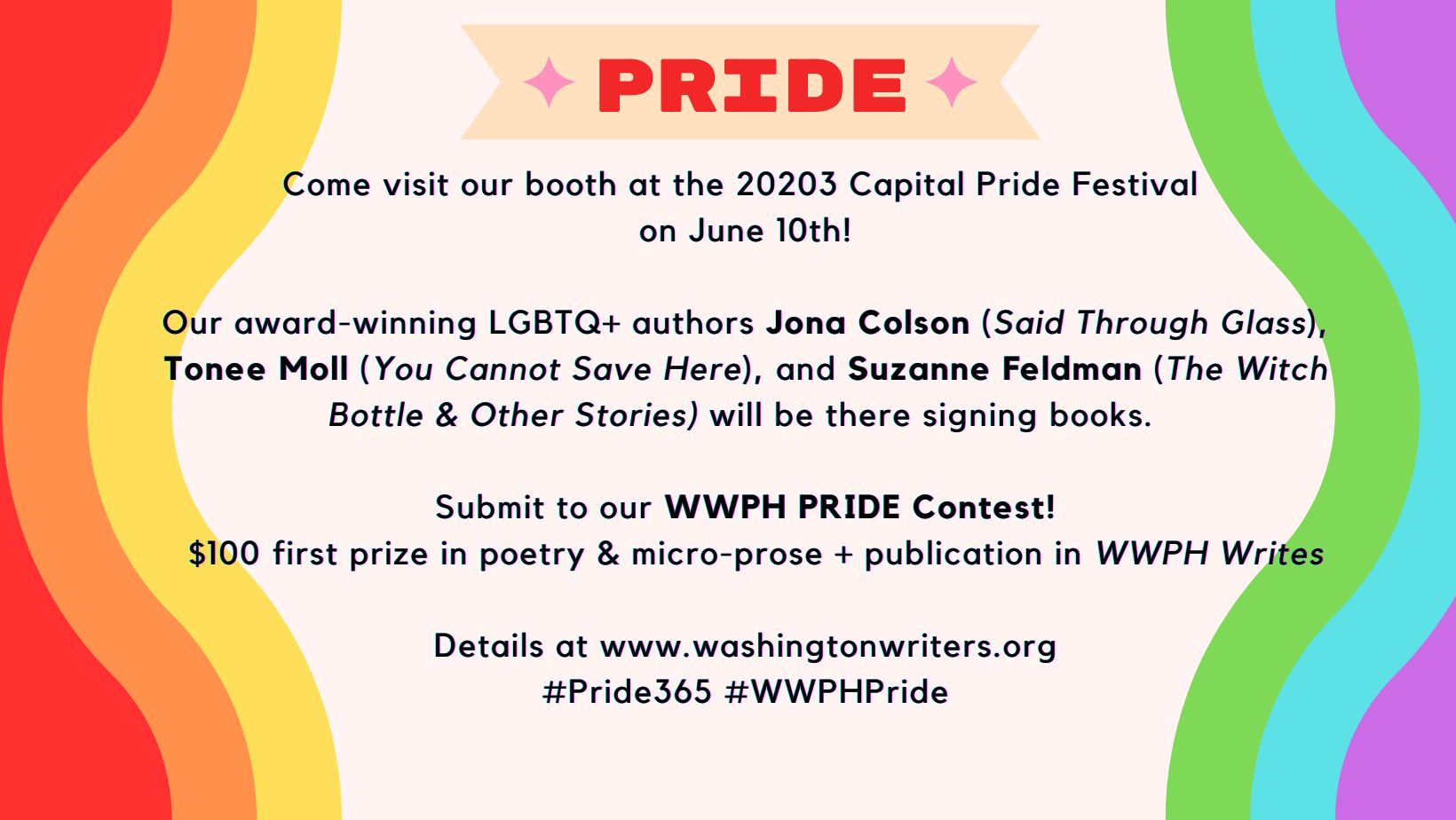
Thinking of submitting to WWPH Writes? We are reading now for our JULY issues. Here’s a prompt: hot summer night in the DMV and submit it to us! And we are always looking for work that celebrates, unsettles, and questions our lives in the DC, Maryland, and Virginia area (DMV) and our nation. New perspectives, diverse voices, and voices with craft and fierceness are strongly encouraged to submit. It’s FREE to submit, but you must live in the DMV. Please send us your best work–challenge us with your ideas and writing. Submit here
Purchase our award-winning books including the new edition of WHY I CANNOT TAKE A LOVER by Grace Cavalieri and ALTAMIRA by Myra Sklarew are available on our new affiliate page on bookshop.org
: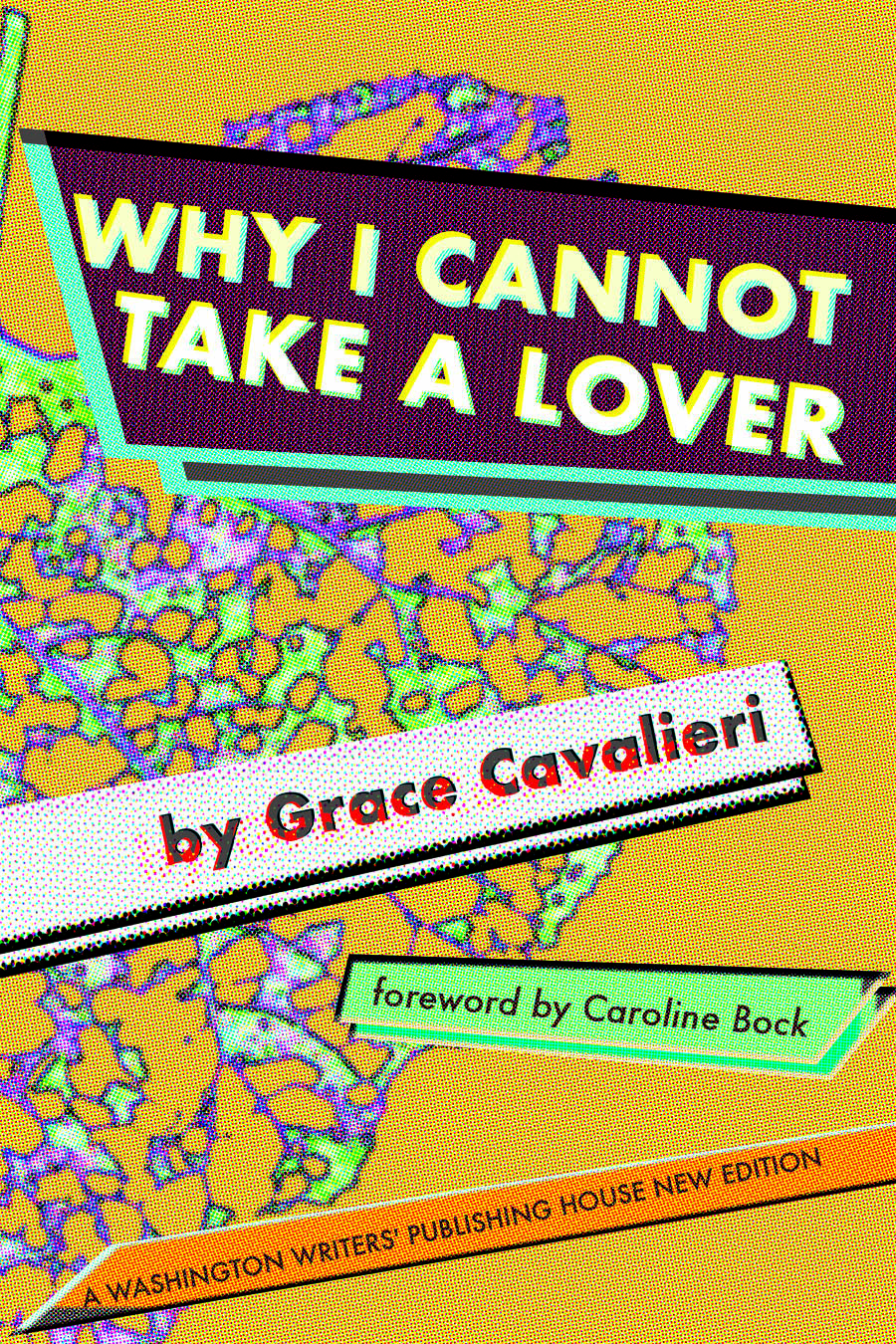
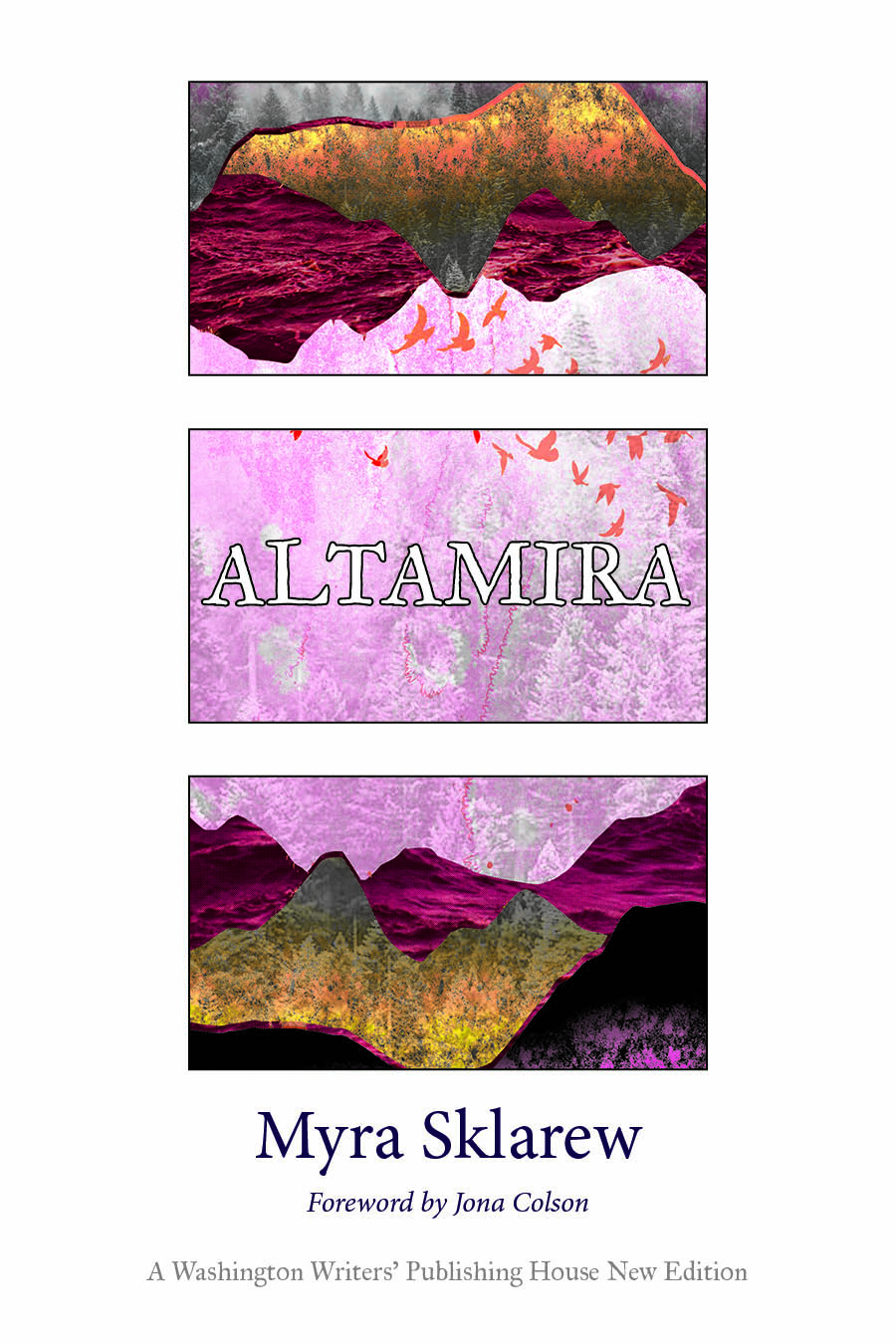
Thank you for being part of the WWPH Community!
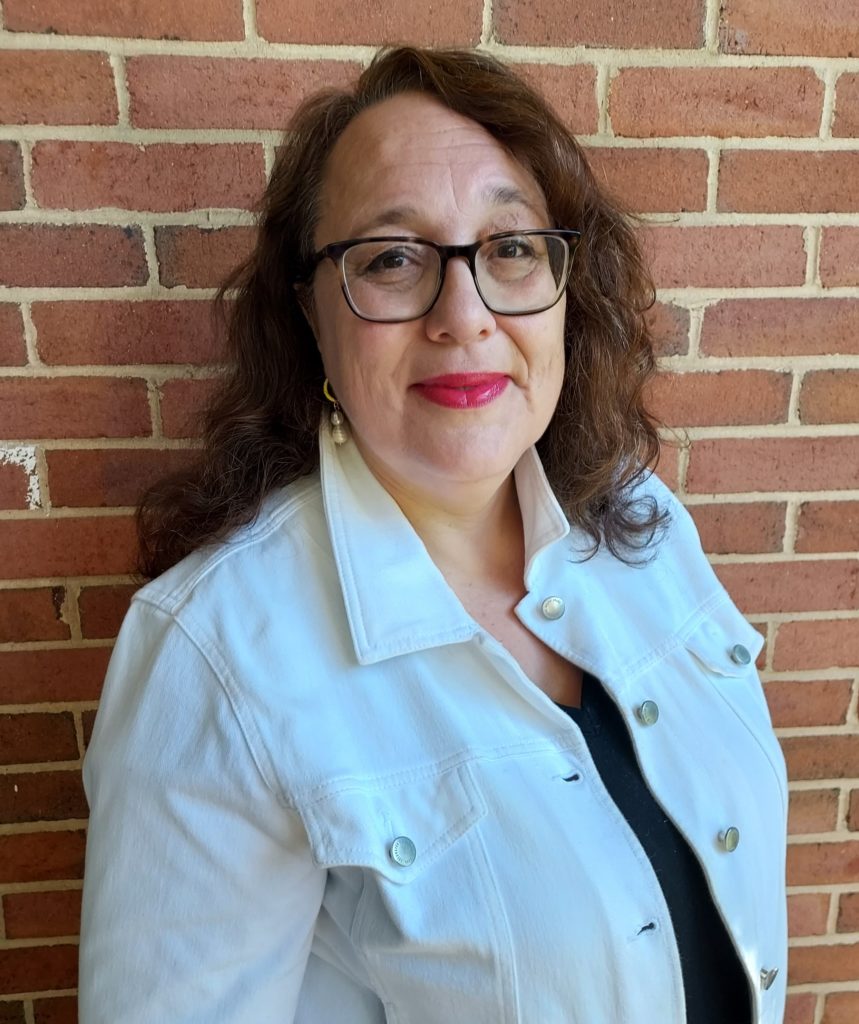
Caroline Bock
Co-President & Fiction Editor, WWPH Writes
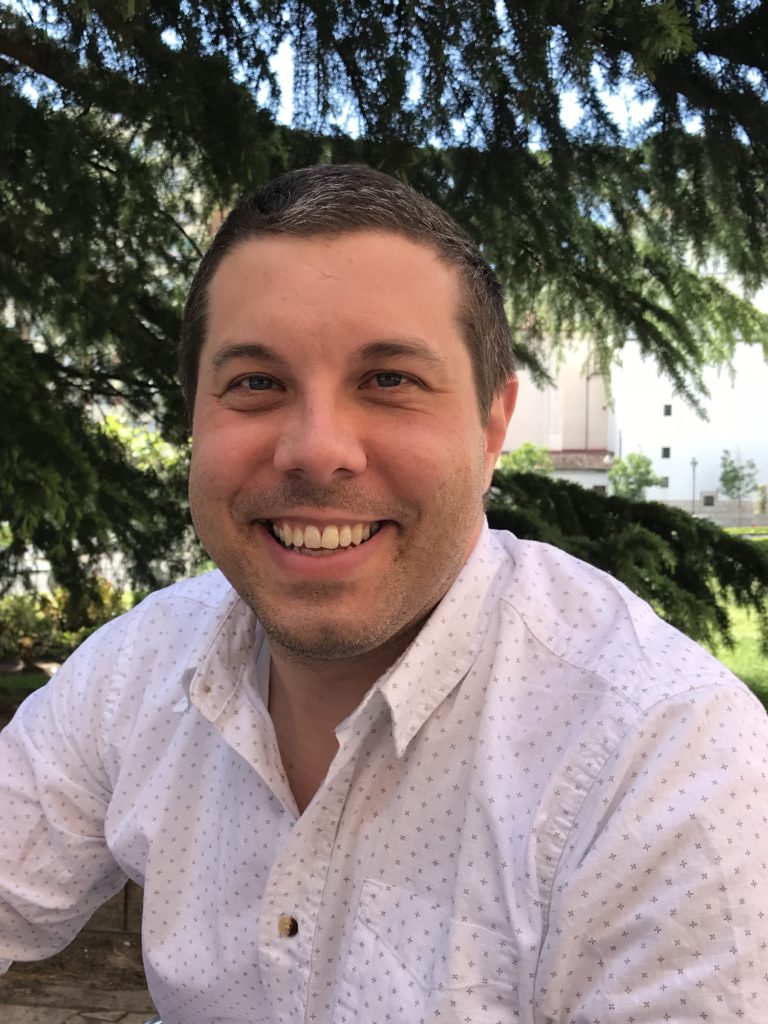
Jona Colson
Co-President & Poetry Editor, WWPH Writes
